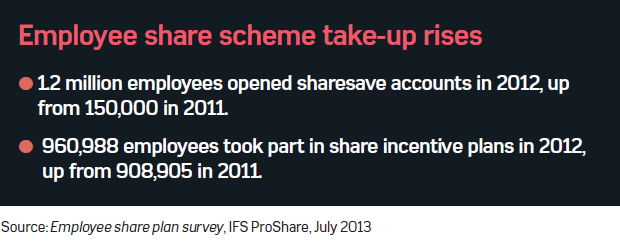Employee share schemes have seen a lot of activity over the past month.
Employees at Sports Direct were among those to enjoy a shares payout. Under the organisation’s 2009 bonus scheme, which is set to mature this month, staff will receive a payout worth 75% of their base salary in shares priced at £1.25.
It is estimated that a Sport Direct shop assistant on a salary of £20,000 will receive 12,000 shares worth more than £77,000, based on the organisation’s share price of 645p on 22 July.
The payout is based on specific profit targets being met in 2009-10, 2010-11 and 2011-12 and follows Sports Direct awarding employees 25% of their base salary in shares at £1 per share in August 2012.
Elsewhere, the government’s privatisation of the Royal Mail will see employees offered shares worth up to £2,000 following its proposed flotation on the the London Stock Exchange.
Phil Hall, special adviser at industry body IFS ProShare, said the Royal Mail scheme would be unique in that 100% of employees could take part. “It’s no coincidence that more than 80% of the FTSE 100 offer their employees a chance of rolling shares,” he said. “That hasn’t happened by accident. They recognise the importance of employee share ownership.”
The employee ownership market has also seen developments recently. Early last month, the government published joint government and industry-led guidance helping organisations move towards employee ownership.
Business secretary Vince Cable made the announcement on the inaugural Employee Ownership Day on 4 July.
Under the initiative, the government will set aside £50 million each year from April 2014 to promote employee ownership models, as announced in the 2013 Budget.
The Department of Business, Innovation and Skills (BIS) has also published guidance for employers that want to move towards employee ownership, including an explanation from the Employee Ownership Association of the different models of employee ownership.
Charles Cotton, performance and reward adviser at the Chartered Institute of Personnel and Development, said this was the government’s latest push to see employee-ownership grow.
But he added: “It’s not necessarily employee ownership that’s important, it’s how employees are engaged in the organisation. It is possible for organisations to engage their staff in a variety of ways, but that’s not to say employee ownership isn’t appropriate.”
